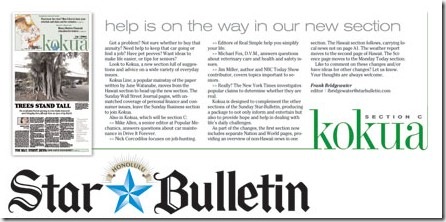Sunday, August 03, 2008
Newspaper meltdown 6: Chasing readers to the web
by Larry Geller
I couldn’t have asked for a better illustration for this article, which I started a couple of days ago, as I found in today’s papers.
I’d like to just wonder out loud whether sending readers to the Web is the best thing newspapers can do for us. After all, most blogs and many websites simply refer to articles that print papers post on their websites. So the source of most news is still dependent on the health of print papers.
Since you’re reading this, I assume that you also read widely on the web and get some, most, or all of the news you are looking for from various Web sources. If so, then a local paper, if we’re talking about its web presence, finds itself squarely in competition with the major national papers, newsmagazines, and websites like the Huffington Post, Slate, and so forth. Where they have little competition is in the local news they gather that does not appear elsewhere. That’s also where they have most value to me. Local news. The kind we still need reporters to gather and editorial writers to interpret.
You also have the opportunity to read international papers’ websites. In the past, unless you lived in New York or a handful of other American cities, you had no access at all to a selection of international papers (in many other countries it’s much easier).
The Internet experience is naturally much broader than a local paper can deliver. For local news, however, it’s our local reporters who inform you, and they work for local media. So we need our local papers. We need them to be healthy.
It goes without saying that if the local papers disappeared, if no reporters covered City Hall, then local news would likely also disappear from the web. Maybe this will change one day, but the experiments are still underway. If no one covered City Hall or our state governments, they’d pretty much do what they liked, wouldn’t they? And we’d never find out what they are up to. Scary. It’s frightening enough sometimes when we do know!
Today’s Advertiser front page highlights one of their blogs, as they often do. These blogs are proliferating, and more power to them. It simply illustrates that the paper is “pushing” us to its website. Is this a good thing? Yes, for us, but maybe no for them.
In the editorial Focus section, editor Mark Platte has devoted his column inches to the paper’s new web design. Again, pushing us to the web (Hey, Mark, who’s paying attention to the print paper?).
Speaking of design, Platte mentioned doing away with that awful carousel that was rotating stories in the feature position on the website. Great! But in its place this morning, was blankness:

In contrast, over at the Star-Bulletin, editor Frank Bridgewater’s column is about significant additions and improvements to the print paper. They’ve added content to the paper. How radical! Good job, Star-Bulletin.
(I’ve wondered if the precipitous drop in the stock prices of many newspaper publishers would make them a takeover opportunity? I was thinking that today, nevermind.)
Bringing David Shapiro’s flASHback articles into the print paper is a great thing, but of course we Volcanic Ash fans were reading him before he was “discovered.” And the Hot Seat excerpts always remind me that the real story, often in the questions asked of the Hot Seat subject but never answered, are omitted in the paper. What we see in the paper is selected, and is a reminder that the better experience for this experiment is to check out the web rather than the paper.
So what have you done, dear editors, to make the print paper better recently? And how do you plan to do it when the 54 layoffs become effective? Are you counting on the Web to save the paper without reporters?



Post a Comment
Requiring those Captcha codes at least temporarily, in the hopes that it quells the flood of comment spam I've been receiving.